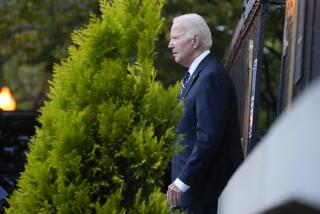FBI Chief Defends Agents’ Questioning of Iraqis in the U.S.
- Share via
WASHINGTON — FBI Director Robert S. Mueller III on Thursday defended a program in which agents have been questioning thousands of Iraqis in the United States, saying it has helped identify possible targets for U.S. troops in Iraq.
“What we have found, in our interviews around the country, is a wealth of information,” Mueller told a House appropriations subcommittee studying the bureau’s fiscal 2004 budget request.
He said the interviews have yielded information about the location of bunkers, tunnel systems, telecommunication networks and other “infrastructure.”
“We have been gratified by the information that we have received, much of it very helpful to those who are now in the war in Iraq,” Mueller said.
The FBI launched the questioning last week -- part of a Bush administration initiative called Operation Liberty Shield -- to ferret out any evidence of planned terrorist reprisals against U.S. interests because of the war in Iraq.
The bureau said another motivating factor was a concern that the Iraqis themselves might become victims of racially motivated hate crimes stemming from the war. Agents wanted to send a clear message that they would aggressively pursue perpetrators.
About 6,700 Iraqi-born people in the U.S. have been questioned so far, Mueller said, out of 11,000 that the bureau has identified for interviews. Officials previously said about 30 people had been detained for immigration violations as part of the sweep.
“They are supportive of our war effort in Iraq,” said a spokesman for the FBI field office in Los Angeles. “We are getting cooperation pretty much across the board from the Iraqis we have interviewed.”
The investigators have cast a wide net: An Iraqi-born imam in Orange County recently said an FBI agent showed up at his mosque one morning to ask some questions. In another instance, the FBI approached an Iraqi-born cardiologist while he was at work at a Southern California hospital.
But the questioning has also left some in the Muslim community disenchanted and embittered. Many fled Iraq to escape atrocities under Saddam Hussein, and now they feel as if they are being victimized again. Agents had already questioned many of them in the weeks and months after the Sept. 11, 2001, attacks.
“I don’t think it is a productive use of our limited law enforcement resources, just to round up a few aliens with visa problems,” said Ibrahim Hooper, spokesman for the Washington-based Council on American-Islamic Relations. The questioning may “alienate an entire community,” he said, by singling out people based on race or ethnicity.
Hooper also questioned whether the people the FBI is interviewing, many of whom left Iraq years ago, have access to current or sensitive information that would be at all useful to the military.
“Is it worth it to talk to someone who used to be a private in the Iraqi army, a conscript?” he asked.
More to Read
Sign up for Essential California
The most important California stories and recommendations in your inbox every morning.
You may occasionally receive promotional content from the Los Angeles Times.












